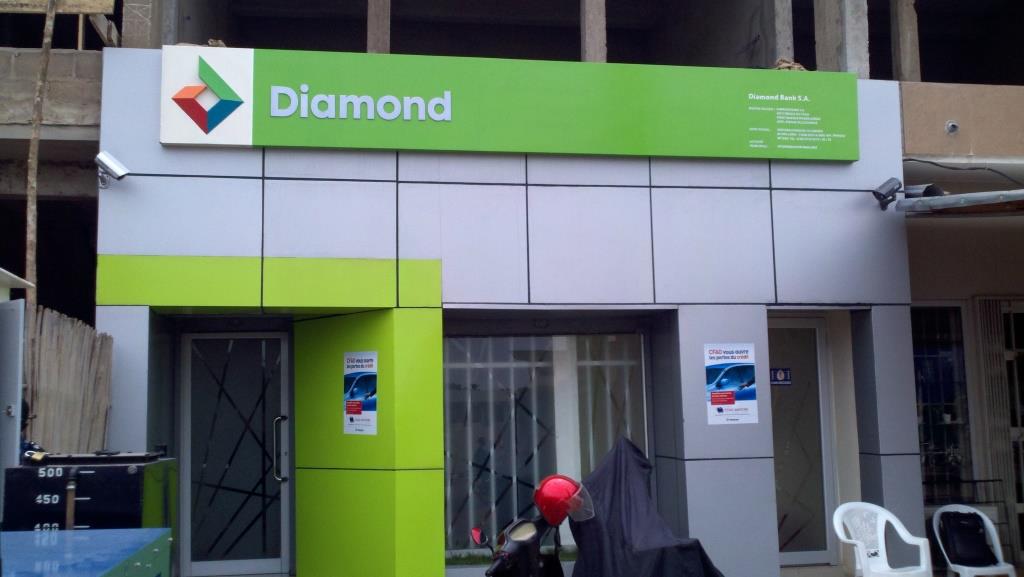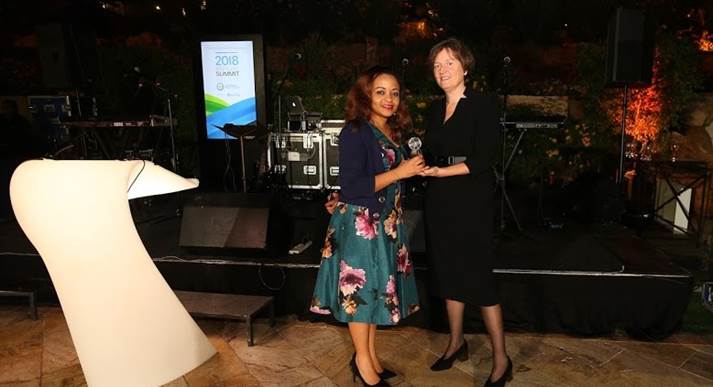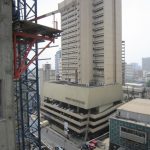Feature/OPED
Diamond Bank: Battling for Survival Under Uzoma Dozie
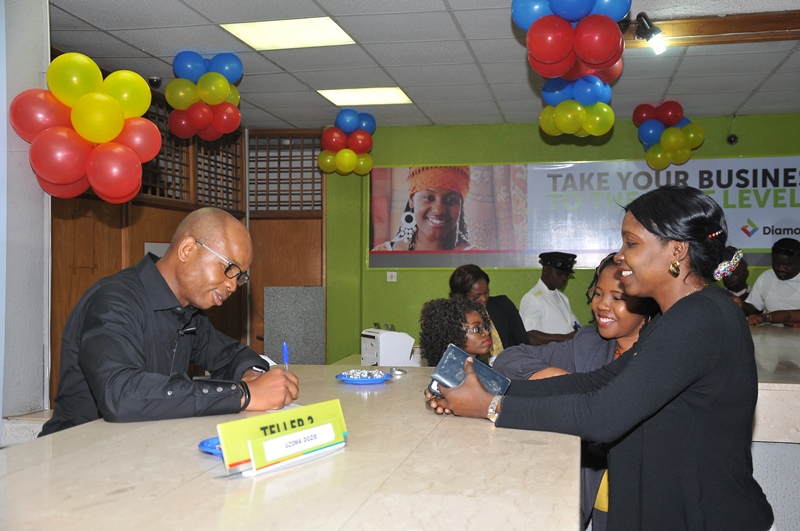
By Bamidele Ogunwusi
The last four years have not been years with more of good news for Diamond Bank, one of Nigeria’s wholly indigenous banks that emerged in the banking architecture of the country in December 1990.
Since it started operations in 1991, the bank has challenged the market environment by introducing new products, innovative technology and setting new benchmarks through international standards. At a point, the bank was Nigeria’s fastest growing retail bank.
For fourteen years, the bank was under the control of its founder, Mr Pascal Dozie, who was also the Chief Executive Officer of the bank. The fourteen years, according to many stakeholders, were the formative years of the bank and the bank indeed rose to the occasion churning out several innovations.
He relinquished the Chief Executive position to Mr Emeka Onwuka at the end of 2005. His exit would however be heralded with improved performance of the bank, which recorded a profit of N5.445 billion for the year 2005.
Onwuka, who took over effectively from January 2006 and handed it over to Alex Otti in 2011 and later to the son of the founder, Uzoma Dozie in March 2014.
The Otti’s years as Managing Director of the bank was referred to as the golden era and the most productive in the history of the bank.
Diamond Bank in Numbers
The period between 1991 and 2000, the bank tried to make its mark in the murky waters of the banking industry in the country and from 2000 the bank began to see improvements in its performance.
In 2001, the bank reported a loss after tax of N467.819 million while there was an improvement in its performance the following year when it reported a loss after tax of N134.960 million. This greatly improved in 2003 when it posed a profit after tax of N903.411 million.
This steadily grew to N7.086 billion at the end of 2007 financial year. It was N2.508 billion in 2004, N5.44 billion in 2005 and N3.977 billion in 2006.
This leaped to N12.821 billion in 2008, while bad loans brought the operations of the bank on its knees in the subsequent two financial years when profit dropped to N1.328 billion in 2009, a loss of N11.214 billion in 2010, another loss after tax of N13.940 billion in 2011.
There was, however, a resurgence in 2012 when the bank posted a profit after tax of N22.108 billion , the first full year in the Alex Otti’s leadership of the bank.
Under Dr. Otti’s leadership, Diamond Bank made a remarkable return to profitability with impressive growth across all performance indicators year-on-year.
After writing off toxic risk assets, which resulted in the loss of N16 billion in 2011, the lender posted a profit before tax of N28.36 billion in 2012 and N32.5 billion in 2013. The bank also saw its total assets rise from N564.9 billion in February 2011 to N1.18 trillion by December 31, 2012 and N1.52 trillion on December 31, 2013.
He is credited with creating the office of the Chief Risk Officer and designating an Executive Director to head the department. He also spear-headed the expansion of the bank by doubling the full staff count from around 2,000 in 2010 to over 4,000 as at mid-2014, even as he vigorously grew the bank’s footprints from a network of 210 branches in 2011 to over 265 branches three years later. It was also under his watch that the bank established an international subsidiary in the United Kingdom, in addition to expansion in Francophone West Africa (Senegal, Togo, and Ivory Coast).
It is to be noted that the Central Bank only recently classified the bank as one of the eight systematically important banks in Nigeria under his watch.
Since the current MD, Uzoma Dozie took over the leadership of the bank in March 2014; the bank’s fortune has been nose-diving.
Many saw his emergence as desperation on the side of the Dozie’s family to ensure that the leadership of the bank returns to the family.
Pascal Dozie was the Executive Director in charge of Lagos Businesses between 2011 and 2013 until his appointment as Deputy Managing Director in April 2013 and charged with the responsibility of overseeing the Retail Banking Directorate of the Bank.
He has attended various specialist and executive development courses in Nigeria and overseas
Following the resignation of Alex Otti, Uzoma Dozie was unanimously appointed by the Board as the Group Managing Director/Chief Executive Officer of the Bank effective November 1, 2014 while the appointment was approved by the Central Bank of Nigeria in December 2014.
In 2015, the bank’s profit after tax went down from N28.36 billion to N5.656 billion. It went down further to N3.499 billion in 2016 and a loss of N9.011 billion in 2017.
In 2017, noticing that it could no longer continue to cope with losses from its subsidiaries, the bank sold its West African operations in Benin, Togo, Cote d’Ivoire and Senegal to Manzi Finances S.A., a Cote d’Ivoire-based financial services holding company.
The bank said the sale of these operations was to enable it focus its resources exclusively on Nigeria as it is poised to capitalise on the positive macro fundamentals inherent in the Nigerian market.
Commenting on the transaction, Diamond Bank’s CEO Uzoma Dozie said: “After 18 years of building the Diamond Bank franchise in other markets in West Africa, the time has come to fully apply our resources to Nigeria. This, Dozie said aligns with Diamond Bank’s strategic objective: to be the fastest growing and most profitable technology-driven retail banking franchise in Nigeria”.
Aside the sale of these operations, the bank is also on the verge of selling its United Kingdom’s operations.
The lender struck a deal with British industrialist, Sanjeev Gupta, earlier this year, after selling its West African subsidiaries last year.
In May, Diamond Bank posted a 2017 loss, its first time in the red in six years after selling assets to conserve capital and to focus on its home market.
Its half-year 2018 pre-tax profit declined by 69 per cent to N2.92bn, hurting its shares, which further fell by 1.60 per cent on Tuesday.
The bank said it expected loan growth to return; growing five per cent this year after credit declined in the first half by 3.6 per cent.
A Bank in Coma
With the latest S&P Global Ratings downgrade of Diamond Bank, it is evident that the fortunes of the bank, which was once one of Nigeria’s top banks about a decade ago has strangely deteriorated into a bank in a coma.
Diamond Bank was downgraded On Weaker-Than-Expected Asset Quality; Outlook Negative
S&P believes that the bank’s provisioning needs will be higher than it initially expected, which will put pressure on the bank’s capitalisation.
Additionally, its foreign-currency liquidity position also remains vulnerable, due to a large upcoming Eurobond maturity in May 2019.
“As a result, we are lowering our global scale ratings on Diamond Bank to ‘CCC+/C’ from ‘B-/B’ and our Nigeria national scale ratings to ‘ngBB-/ngB’ from ‘ngBBB-/ngA-3’.
The negative outlook reflects pressure on the bank’s capitalization and foreign-currency liquidity,” The foremost rating agency said.
The rating action by S&P considers Diamond Bank to be currently dependent on favorable business, financial, and economic conditions to meet its financial obligations.
It said it believed that the bank will have to set aside higher provisions than they initially expected, following the adoption of International Financial Reporting Standard No. 9 (IFRS 9), which implies weaker asset quality than expected and exerts significant pressure on the bank’s capitalization,” The report said
It went further to say that “Following the bank’s successful disposal of its West African subsidiaries, and imminent disposal of its U.K. subsidiary, it expects it to convert its license into a national banking license. The license conversion would mean a lower minimum capital adequacy ratio (10% versus 15% currently) and lower risk of breach. However, the timing is uncertain, and it considers that there is significant pressure on its capital position. Moreover, four of the bank’s 13 board members have resigned recently, which could create instability if left unresolved in the near term.
“As at Dec. 31, 2017, the bank’s regulatory capital adequacy ratio reached 16.7 per cent. It dropped to 16.3 per cent in Sept. 30, 2018, on the back of IFRS 9 implementation and amortization of tier-2 capital instruments. The initial implementation of IFRS 9 resulted in the bank taking a Nigerian naira (NGN) 2.5 billion (approximately $7 million) deduction from retained earnings at June 30, 2018.”
The agency believes that the bank will have to take higher provisions for IFRS 9, using the N31 billion of regulatory risk reserves that it holds under the local prudential guidelines. Based on peers’ experience and the bank’s weak asset-quality indicators, it estimate the impact will significantly exceed the regulatory risk reserves and estimates that their risk-adjusted capital (RAC) ratio will reach 3.4%-3.9 per cent in the next 12-24 months compared with 5.3 per cent at year-end 2017.
The impact, according to S&P, will be somewhat tempered by the capital gain when the sale of the bank’s U.K. subsidiary is finalized.
“We expect the bank’s credit losses to average 5 per cent over the same period, while nonperforming loans (NPLs; including impaired loans and loans more than 90 days overdue but not impaired) will remain above 35% in the next 12-24 months after reaching 40 per cent at Sept. 30, 2018.
“Overall, we think the bank will display losses in the next 12-24 months. In May 2019, Diamond Bank will have to repay its maturing Eurobond principal of $200 million. The bank plans to use its foreign-currency liquidity and the proceeds from the sale of its U.K. subsidiary for the repayment, among other sources. Any delays or unexpected developments could exert downward pressure on the ratings.
”Following the recent resignation of board members, the bank could face some outflows of deposits, but the granularity of its deposit base and its historically good retail franchise are mitigating factors.
“The negative outlook reflects the pressure on the bank’s capitalization from weaker-than-expected asset-quality indicators and on its foreign-currency liquidity due to a large upcoming maturity in May 2019. We could lower the ratings if provisioning needs proves higher than what we currently expect, leading to a decline in capitalization as measured by our RAC ratio (below 3%) or a breach in the local regulatory requirements.”
Financial experts believe that the declaration by S&P may have further put the bank in a more precarious situation and many are calling on the management to look into the system of the bank and proffer solution.
Cyril Ampka, an Abuja-based financial expert, believes that the dwindling fortune of the bank was not unconnected with the decision of the “owners” of the bank to keep the management of the bank in the family.
“If you look at the time the bank started having this problem you will see that it coincide with the emergence of Mr Uzoma Dozie as the Managing Director of the bank. The decision of the owners of the bank to still keep leadership of the bank within the family is not favourable to the fortune of the bank,” he said.
Though the bank claimed it now controls 40 per cent of the volume of Unstructured Supplementary Service Data (USSD) transactions in the banking sector but there are indications that the bank is losing several of its clients in most parts of the South-East and South-South to another Tier 2 bank.
No Merger Talk
Reacting to a report that the bank is in discussion with Access Bank over a possible merger or takeover, Uzoma Uja, Diamond Bank’s Company Secretary, said it was not in discussion with any financial institution at the moment on any form of merger or acquisition.
Uja said that the attention of Diamond Bank had been drawn to the rumour in the media stating that the bank was purportedly in discussion with Access Bank to acquire the bank.
“We wish to state categorically that the bank is not in discussion with any financial institution at the moment on any form of merger or acquisition.
“We trust that the above clarifies the position of the bank with regards to the rumour on the various media platforms,” Uja said.
However, recent analysis by proshare had revealed a concern around the survival of the bank and the need for the CBN to act decisively on its financial stability mandate; given the disposition and realities of its Tier 1 banks, a few that had its own hands full in dealing with legacy challenges apart from new operating environmental issues.
The bank had to content with a CBN levy over a disputed role with regards to MTN Nigeria causing it to issue a notice on CBN Levy on the London Stock Exchange on Sep 07, 2018
Sometime later in September 2018, as the Nigerian Stock Exchange (NSE) issued letters and was set to suspend Skye Bank, Unity Bank and Fortis Microfinance for non-submission of its financials in violation of the post-listing rules. A day before the ultimatum expired, the CBN Governor wrote in to ask the NSE to stay action on these institutions because the CBN was involved in serious discussions for which such an action by the NSE may complicate/jeopardize.
It noted that the withdrawal of license of Skye Bank Plc, and issuing a new one to Polaris Bank, equally left a lot of unanswered questions about the investor protection mandate of the Securities & Exchange Commission (SEC) and of NSE’s observance of its post listing rules which, at the heart of it, dealt with the investor-market trust and integrity issue.
Consequently, it observed that if in the case of the stress test conducted by CBN, which they found out had three (3) banks failing the minimum regulatory liquidity ratio of 30%, but that the non-disclosure of the names of such banks in a controlled manner presented signaling challenges.
“If in the case of Diamond Bank, with its sheer size and base, has its capital eroded due to huge NPLs with no proactive approach to its resolution plans; and continues to engage in communications juggling, what signals should the markets pick from the state of affairs of such an institution?”
The hole created in the capital gap is quite huge and to fill the hole will require, according to the analysts. Significant haircut from the CBN; Forbearance of accounts (including NPL’s) against the bank; and A fresh injection of capital that could easily come from an ‘acquisition’.
Note: The headline of this story was cast by Business Post but the article was culled from Daily Independent Newspaper
Feature/OPED
Why President Bola Tinubu Has the Edge in Retaining Power in 2027
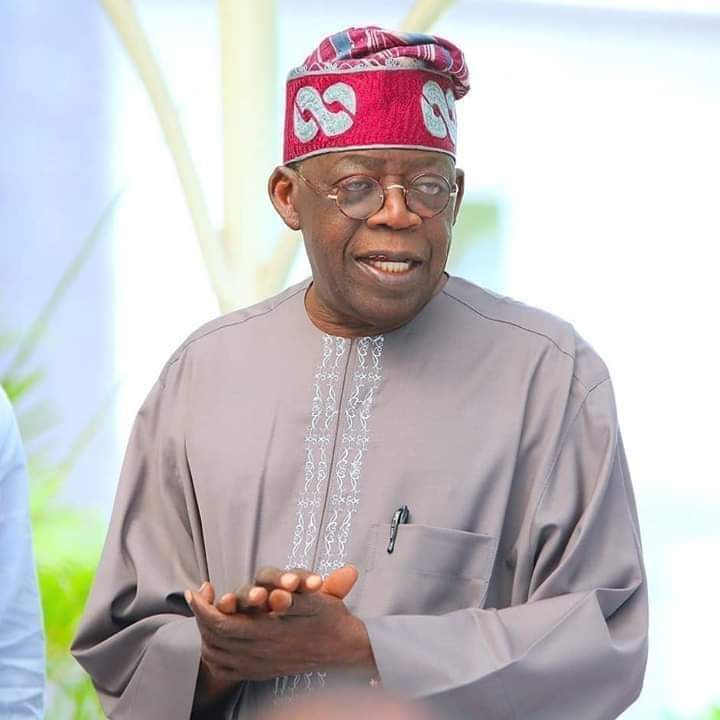
By Kenechukwu Aguolu
As the year 2027 draws closer, political manoeuvrings and calculations are already underway across Nigeria. The landscape is expected to shift, with new alliances and coalitions forming among political actors and parties. However, in my view, the chances of the current administration retaining power in 2027 remain high, and several compelling reasons support this assertion.
First and foremost, the All Progressives Congress (APC), the party currently in power, stands as the most formidable political force in the country. The APC boasts an unrivalled structure, a stable leadership, and the highest membership among all political parties. With the largest number of serving governors and National Assembly members, the party is firmly entrenched in all corners of the nation. These factors alone give the APC a significant advantage as it gears up for the 2027 presidential elections.
Under the leadership of President Bola Tinubu, the current administration has displayed a deep sense of patriotism and a clear vision for Nigeria’s future. While the reforms introduced by the government came with initial challenges, these difficulties are gradually easing, and the results are becoming increasingly evident. Prices of goods and services are steadily dropping, and the Naira is beginning to show signs of recovery.
The government’s efforts to diversify the economy are also bearing fruit, with initiatives such as the revival of the Ajaokuta Steel Company and ongoing reforms in the mining sector. By 2027, the dividends of these economic reforms will be more apparent, and the public will be able to feel their positive impact. These successes will work in the administration’s favour and could solidify the APC’s hold on power.
Infrastructure and security have been at the forefront of the government’s priorities. Significant improvements in power generation have already been made, and efforts to tackle insecurity have begun to show positive results, albeit gradually. Furthermore, the government is investing heavily in road construction, including vital projects like the Lagos-Calabar Expressway.
These infrastructural developments are not just for show—they will stimulate economic activities across the country, create jobs, and enhance the living standards of Nigerians. If these trends continue, it will be hard for any political opponent to deny the progress made under the current administration.
Perhaps the most critical factor in the APC’s favour is the leadership of President Tinubu himself. With his personality, widespread followership, and experience, he stands as a political giant in Nigeria. His leadership has been marked by a strong sense of purpose and determination, and his vast network of supporters spans across different regions of the country.
While some may argue that time will tell who will emerge as a viable challenger to President Tinubu, it’s difficult to imagine any politician currently being touted as a credible candidate who could match his national appeal and charisma. The nature of Nigerian politics means that any potential challenger would need to command significant nationwide support to pose a real threat to the APC’s grip on power.
Looking ahead to the 2027 presidential election, I believe it will be much easier for President Tinubu to secure re-election than it was in 2023. His leadership performance, coupled with the robust support of the APC, places him in a strong position for victory. While unforeseen events may shape the political landscape over the next few years, the factors already in play suggest that the current administration is well-positioned to retain power.
Feature/OPED
Collaboration Made Easy Using a Work Management Platform

By Firas Jadalla
Effective collaboration between security operators, teams, and other departments is essential for the smooth functioning of any organization. However, as organizations grow in complexity, it becomes increasingly challenging for teams to coordinate. Factors such as staffing shortages, high turnover rates, and outdated collaboration tools exacerbate these challenges.
When staff rely on multiple disconnected tools for dispatch, reporting, and task tracking, operations often become fragmented, leading to delays and gaps in communication. In critical areas like safety and security, these inefficiencies can have serious consequences.
Work management solutions bridge these gaps by managing, tracking, and documenting activities, streamlining processes, and fostering real-time collaboration. Built specifically for security teams, these solutions enhance communication, boosts productivity, and improves overall operational efficiency through workflow automation.
Organizations in Africa and the Middle East operate in high-security environments where seamless collaboration is essential. A robust work management platform enables swift response and coordination across complex operational landscapes.
This growing need for integration is driving more organizations to align their security and IT departments. According to a recent Genetec report, 78% of end users in the META region indicate that these departments now work collaboratively, reflecting a shift toward a more unified security approach.
Overcoming barriers to effective collaboration
Over time, many organizations accumulate a patchwork of databases, spreadsheets, and standalone systems to communicate, create reports, and track activities. Some still rely on outdated paper-and-pen processes, which aren’t only time-consuming but also prone to errors. These disjointed methods hinder information sharing and coordination.A digital work management platform consolidates these fragmented systems, offering teams a unified view of activities accessible on both desktop and mobile devices. To take full advantage of their security system data, security teams need to consider more than a generic work management solution.
An ideal work management solution for security teams should accommodate security activities such as guard tours, patrols, and maintenance inspections. It should also seamlessly integrate with existing security systems. For instance, a video operator should be able to create a work request with an attached camera snapshot and route it to the appropriate team in just a few clicks. To ensure trustworthy audits and reporting, the work management system should be built with strong cybersecurity measures and ensure that data can’t be manipulated after the fact by applying blockchain principles.
Benefits of work management systems
Implementing a work management system can transform security operations in several ways:
- Improved Communication: Teams gain real-time visibility into task progress, responsibilities, and pending assignments. Updates and alerts can be shared seamlessly to request assistance or provide situational awareness.
- Enhanced Collaboration: Every team member contributes to shared goals rather than isolated tasks. Custom API integrations can connect with other systems, such as employee apps, further fostering teamwork.
- Time Savings: Built-in reporting tools automate activity logs and compliance audits, freeing up time for other critical tasks.
- Operational Efficiency: Routine tasks, incident management, and resource tracking are streamlined. Tasks are assigned to personnel with the appropriate skills, tools, and knowledge, ensuring readiness and precision.
- Workflow Automation: Automations simplify recurring tasks, such as setting reminders, generating reports, or notifying team leads when new requests are added.
- Resource Optimization: Features like work ticketing and asset management enable efficient resource allocation and management of internal and external requests.
- Mobile Support: Field officers benefit from mobile apps that enhance situational awareness, communication, and access to standard operating procedures on the go.
Today, governments in Africa, for instance, are heavily investing in smart security solutions as part of their national digital transformation strategies. A centralized work management platform not only supports these efforts but also helps businesses align with evolving security regulations, ensuring compliance and streamlining reporting processes.
Tips for successful implementation
Every organization has unique workflows, so selecting a customizable work management system is crucial. It’s important to choose a solution that’s customizable and intuitive to minimize the need for extensive training.Integration is another key factor.
A platform that deeply integrates with your existing security ecosystem provides a cohesive view of operations and eliminates the need for manual data transfers or redundant processes.A well-designed work management system can break down silos, empower teams, and boost efficiency. To ensure a successful deployment, adopt a lean and agile approach: start small and gradually incorporate more features as your team becomes comfortable with the platform.
With initiatives like Kenya’s Konza Techno City, Nigeria’s Eko Atlantic City and Abuja Centenary City, organizations are increasingly integrating AI-driven security and IoT-enabled monitoring into their operations. A work management platform with automation capabilities supports these advanced security frameworks.
Firas Jadalla is the regional director for Middle East, Turkey & Africa at Genetec Incorporated
Feature/OPED
From Struggle to Stability: How FinTech is Helping Nigerian SMEs Overcome Cash Flow Challenges

When Mrs Agbaje started her school in Ibadan twelve years ago, she didn’t envision a tech-enabled future. Her dream was simple—provide affordable, quality education to children in her community. For the most part, she made it work. But as the school grew, a new challenge took root. It wasn’t infrastructure. It wasn’t teacher retention. It was something far more basic: getting paid.
Each new term brings the same pattern. Parents promise to pay fees “by next week.” Some follow through. Many don’t. As the term wears on, Mrs Agbaje finds herself juggling spreadsheets, reminder texts, and awkward conversations in car parks or at school gates. Meanwhile, salaries must be paid, books restocked, diesel bought. More often than not, she dips into personal savings to keep things running.
Her story is common across Nigeria. Small businesses—whether they’re schools, salons, logistics firms, or cooperative groups—are constantly navigating the emotional and financial toll of delayed payments. And it’s not just a matter of inconvenience. A recent study by MacTay Consulting found that Nigerian SMEs wait between 60 to 120 days on average to receive payment for services or products already delivered. That kind of delay is more than a hiccup. It threatens livelihoods. It blocks growth. It’s a silent killer.
For Chuks, who runs a car hire service in Enugu, the issue is tied to his bigger corporate clients. They insist on “net 30” or “net 60” terms—industry-speak for “we’ll pay you in a month or two.” That might be manageable for a large fleet with strong cash reserves, but for someone like Chuks, every week matters. With fuel prices rising and maintenance bills stacking up, he’s often forced to park cars because he doesn’t have the cash to fix them—even when work is lined up.
What links these stories is the reality that small businesses operate in a system where money is constantly in motion but rarely on time. Customers often mean well, but their own financial instability creates a domino effect. And the existing tools to manage payments—handwritten ledgers, POS machines, WhatsApp reminders—were never designed for structure. They’re patched solutions to a systemic problem.
Even digital banking, for all its advancement in Nigeria, hasn’t solved this issue. Many SMEs still operate informally, managing finances through personal bank accounts or apps not tailored to business needs. The result is a messy web of follow-ups, reconciliations, and emotional strain. Business owners become debt collectors, chasing down what they’ve already earned, time and time again.
What’s often missed in conversations about entrepreneurship is just how deeply this problem cuts. Payment delays mean rent can’t be paid on time. It means holding off on hiring a new staff member, or letting go of a part-time assistant. It means saying no to growth opportunities, not because they’re not viable, but because the cash flow isn’t predictable enough to take the risk.
And when you zoom out, the implications are national. Small businesses make up over 90% of enterprises in Nigeria. They contribute nearly half of the country’s GDP and employ a significant portion of the workforce. Yet, their greatest enemy isn’t market competition—it’s irregular income. This is a structural inefficiency that deserves far more attention than it gets.
Slowly, however, change is beginning to show. A quiet revolution is underway—one where technology is stepping in not as a trend, but as a tool for financial stability. More SMEs are beginning to explore digital solutions that streamline payments and reduce friction between businesses and customers.
Among these solutions is PaywithAccount, a new tool launched by Nigerian fintech company OnePipe. Designed specifically for businesses with recurring payments—schools, cooperatives, service providers—it allows them to automate collections directly from customers’ bank accounts. With full consent and transparency, payments can be scheduled, reducing the need for repeated follow-ups or awkward reminders.
For Mrs Agbaje, this has made a significant difference. Parents receive structured payment plans, reminders go out automatically, and debits happen based on prior agreement. She now spends less time tracking who has paid and more time planning curriculum upgrades and engaging with teachers.
The benefit isn’t just financial—it’s emotional. When business owners don’t have to chase payments, they gain time, clarity, and confidence. They can plan ahead, restock inventory, or finally invest in that expansion they’ve put off for years. And for customers, the experience feels more professional, more trustworthy. Everyone wins.
Technology won’t solve every problem for Nigerian SMEs. But smart, well-designed financial tools are starting to remove some of the biggest roadblocks—quietly and effectively. And that’s the point. The best systems aren’t flashy. They work in the background, reducing stress, restoring dignity, and enabling business owners to focus on what truly matters.
For Ope Adeoye, founder of OnePipe, the issue is personal. “Every Nigerian knows someone who runs a business—a cousin, a friend, a neighbour. When they suffer from late payments, it affects whole families and communities. Fixing this isn’t just a business goal—it’s a social one.”
In a country as dynamic and entrepreneurial as Nigeria, the challenge is rarely about lack of ideas. It’s about systems that help those ideas survive. And one of the most overlooked systems is the way money flows—or fails to.
As more SMEs embrace tools that put payment on autopilot, a future of stability—rather than constant survival—starts to feel possible. And in a nation powered by small businesses, that kind of shift could move mountains.
-

 Feature/OPED5 years ago
Feature/OPED5 years agoDavos was Different this year
-
Travel/Tourism9 years ago
Lagos Seals Western Lodge Hotel In Ikorodu
-

 Showbiz2 years ago
Showbiz2 years agoEstranged Lover Releases Videos of Empress Njamah Bathing
-

 Banking7 years ago
Banking7 years agoSort Codes of GTBank Branches in Nigeria
-

 Economy2 years ago
Economy2 years agoSubsidy Removal: CNG at N130 Per Litre Cheaper Than Petrol—IPMAN
-

 Banking2 years ago
Banking2 years agoFirst Bank Announces Planned Downtime
-

 Sports2 years ago
Sports2 years agoHighest Paid Nigerian Footballer – How Much Do Nigerian Footballers Earn
-

 Technology4 years ago
Technology4 years agoHow To Link Your MTN, Airtel, Glo, 9mobile Lines to NIN



